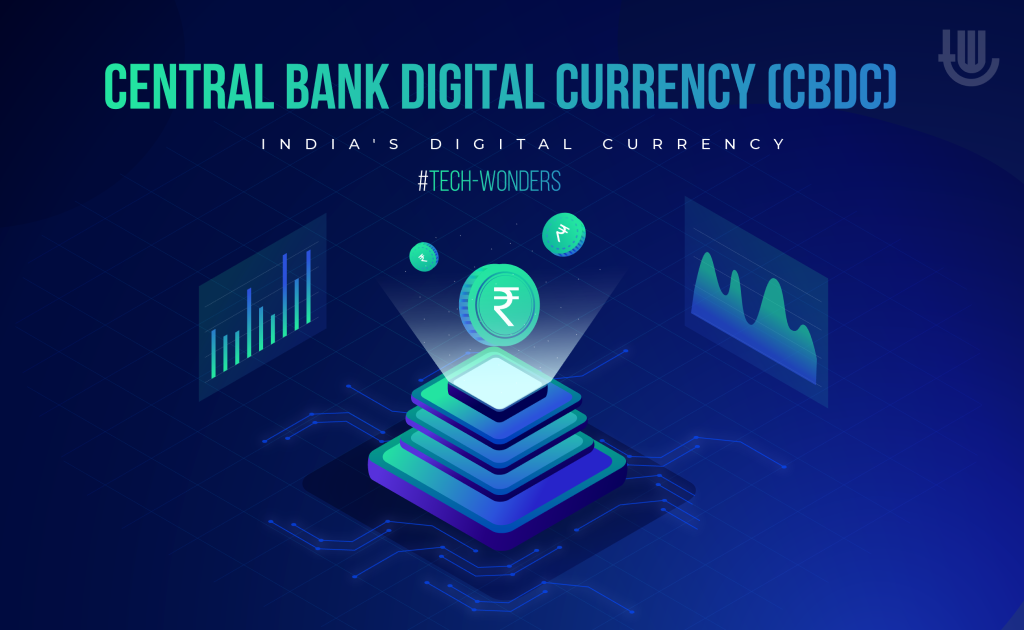Digitization has entered every field today, and so has finance revolutionized with digitization. There has been news about the Central Bank Digital Currency (in short, CBDC) floating, and we have raised our eyes to curiosity. When a currency becomes centralized and yet digital, new ideas and hypotheses come into existence. So without wasting any more time, let’s know more about CBDC- India’s Digital Currency Initiative.

What is CBDC? How is it different from other currencies?
We are already aware of other currencies in the crypto market, such as Bitcoin, Litecoin, Etherium, and many more. So what is going to set CBDC apart from them must be the question! The answer to this is centralization. While a centrally governing body will regulate the transactions, this currency is nothing but cash in digital form.
So far, this announcement has no implementation in reality. However, various hypotheses, propositions, ideas, and scenarios do exist. Recently, China is the country to implement digital currency after a ban on cryptocurrency and the market. The concept of digital currency was introduced in the year 2020 in the Bahamas.
However, we’ll be able to facilitate the peer-to-peer transfer of money without wasting time or involving any third-party agents.
Features of CBDC
Here are some facts and features to provide you a comprehensive idea of what exactly will CBDC be! While a committee was set up to analyze the future market of CBDC in 2017, the announcement was made recently.
- CBDC is a tender ledger that will be regulated and monitored by a central governing body. With CBDC, we can eliminate the dependencies on various factors such as operationality and intermediaries.
- In this case, the Indian CBDC will be referred to as a digital rupee and is all set to hit the trials by December 2021.
- Volatility is not the issue here with ‘digital currency,’ unlike some cryptocurrencies that we know.
- There are discussions for a digital ledger, essentially a digital database for the transactions, to be implemented along with the digital rupee.
- There won’t be any fluctuations in any way by owning/trading the digital currency. So your net worth will not be affected at any time by owning CBDC.
- Digital currencies are hoped to be the future of the Indian financial system, improving stability and reducing the security risks- physically and digitally.
- With the increase in digital payments, especially in pandemic times, global acceptance has paved the way for digital currencies to operate largely without any physical existence.
Pros and Cons of CBDC
As the title suggests, here are some pros and cons of implementing the CBDC.
Pros
Minimum interference of a third-party agency
It becomes easy to transfer money through peer-to-peer communication; you can eliminate a third-party agency here. Within a few hours, your money would be sent to anyone or any place that approves CBDC. It implies not waiting for them to approve the transfer, not waiting in a queue or application, and no additional fees charged for the transaction.
Reduced scams and crime such as money laundering
Yes, even if there’s an alleged fraud, remember a centrally operating body is always monitoring the transactions. While the paper cash may be difficult to track and go unnoticed, CBDC won’t! And with blockchain technology, every block of metadata will contain precise information of the transfer. With this, there will be a significant reduction in crimes such as money laundering and scamming.
Cons
Unknown implementation but heavy expectations
People in India are curious about CBDC; scientists have so far put hypotheses and possible ways to implement it. But we are still not sure what to expect from the digital currency and the distinct features. So far, we have many assumptions and expectations from CBDC, but no concrete action yet.
Unreliability of acceptance
CBDC might be easily accepted among technologically sound people. But some people who still prefer cash and are unfamiliar with the digital world of transactions might not be open to the idea. Besides, there are also finance agencies and banking sectors that may or may not accept the idea. Even if they do, then there will not be an immediate replacement. The overall ‘acceptance’ factor among people and banks will take time.
Questions that arise of CBDC
Does CBDC implement the Blockchain or Cryptocurrency technology?
Yes, CBDC is a virtual currency that will be based on blockchain technology. However, it might not be exactly similar to what we know as a cryptocurrency. It is a legal tender issued by the government; this broadly differentiates the fundamental basis of cryptocurrency and CBDC.
How is it different from payment portals like Google Pay, PhonePe, and Paytm?
While CBDC is a legal tender in itself, the platforms such as Google Pay, PhonePe and Paytm are platforms to carry out the transactions. Hopefully, if everything works out well, the chances are that CBDC can be exchanged through these platforms.
What impact will CBDC have in the future?
CBDC will be a big revolution in the finance system. The technology will help the central body efficiently monitor the transactions and eliminate fraud to a maximum level.
Is a centrally operating digital currency system a good idea?
While we have seen the pros of implementing a digital currency system in India, we are still unsure if it is a good idea and how it will largely benefit the users. Another problem lies in educating the appropriate use of CBDC and making them aware of the pros and cons.
Is e-RUPI any different than CBDC?
Yes, while both e-RUPI and CBDC are digital systems operating in India, both are slightly different. CBDC is a centrally operated legal tender system, and e-RUPI will be a voucher limited to the person receiving it. It can not be exchanged, and the only person having an e-RUPI will benefit from it.
Related read: What is e-RUPI? Know all about it here!
Towards the conclusion
As we conclude on the topic of CBDC- India’s Digital Currency Initiative, all we know so far is that an amazing revolution in Indian finance is about to take place. As the facts are being discussed, it is clear that CBDC is not a cryptocurrency coin backed by blockchain technology but paves the way to understand these markets simultaneously. With this, we hope that the acceptance factor is resolved and people get aware of the pros and help in eliminating the cons. Hope you liked the article and found it informative.

Author Bio:
This article has been written by Rishika Desai, B.Tech Computer Engineering graduate with 9.57 CGPA from Vishwakarma Institute of Information Technology (VIIT), Pune. Currently works as Threat Intelligence Researcher in CloudSEK. She is a good dancer, poet and a writer. Animal love engulfs her heart and content writing comprises her present. You can follow Rishika on Twitter at @ich_rish99.